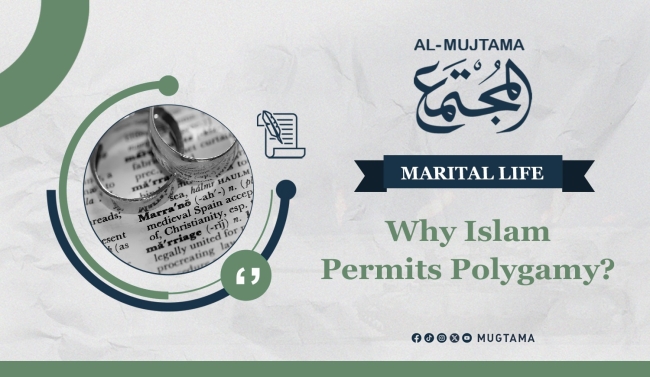The issue of polygamy has often been misused unjustly against Islam. Secularists and atheists frequently attack Islam, claiming that it oppresses women by allowing polygamy, which they argue disregards women's natural feelings. Some even go so far as to demand equality in the right to polygamy for both men and women, ignoring the psychological and physical nature of women. They forget that polygamy existed before Islam in pre-Islamic societies, where men could marry an unlimited number of women. Islam came to regulate this practice, setting limits and conditions to preserve the fabric of society from disintegration and to maintain the sanctity of the relationship between the husband and his wife.
Why Did Islam Permit Polygamy?
The nature of men differs from that of women. While a woman cannot have more than one husband due to her feelings, which cannot love two men simultaneously, and her physical nature, which would lead to confusion of lineage if she were to engage with multiple men. Men, on the other hand, have different needs. Some men are not satisfied by one woman, especially considering that women experience periods and childbirth, during which men are prohibited from approaching them. Thus, some men marry a second or even a third wife to fulfill their needs within the limits set by Allah. Additionally, a woman might not be intellectually compatible with her husband, might not meet his emotional needs, or might be infertile. In such cases, a man may marry again to keep himself away from sin and to give another Muslim woman, who might be unmarried, divorced, or widowed, a chance at marriage.
Polygamy is not just for men; it also serves societal needs. Due to wars and accidents that predominantly affect men, the number of women in society often exceeds that of men. Polygamy helps reduce the number of unmarried women, providing them with partners and preventing them from being alone, especially if they have nobody to care or be responsible for them.
Because polygamy can serve as a societal remedy, in Germany they held Munich conference in 1948 after World War II, proposing polygamy to address the surplus of women left after many men perished in the war. The proposal was, however, interjected by the Vatican.
Thus, Dr. Ali Al-Sallabi said, “All societies that prohibit polygamy and criticize its permissibility on the grounds of harming women's dignity and feelings, or causing social problems like family discord, allow women to engage in the most degrading forms of relationships, including fornication and adultery.”
Is All Polygamy Permissible?
Islam does not permit polygamy unconditionally. Unlike previous civilizations, Islam limits it to a maximum of four wives. Allah says, “Then marry those that please you of [other] women, two or three or four.” (An-Nisa: 3) Moreover, it warns men against injustice and unfair treatment of their wives. Allah also says, “But if you fear that you will not be just, then [marry only] one or those your right hand possesses. That is more suitable that you may not incline [to injustice].” (An-Nisa: 3)
The Prophet Muhammad (peace be upon him) forbade marrying close relatives simultaneously to prevent jealousy and discord. Abu Hurairah (may Allah be pleased with him) reported that the Prophet said, “A man may not marry a woman and her paternal aunt, or a woman and her maternal aunt.” (Agreed upon)
The first condition for polygamy is the man's ability to treat all his wives justly, as much as possible, following the Prophet's example. The Prophet (peace be upon him) was just to his wives in everything, despite his deep love for Aisha. He said, “O God, this is my division concerning what I possess, so do not blame me concerning what Thou possessest and I do not.” (Reported by Abu Dawood, At-Tirmidhi, and Ibn Majah) Additionally, Abu Hurairah (may Allah be pleased with him) reported that the Prophet said, “Anyone who has two wives and inclines to one of them will come on the Day of Resurrection with a side (of his body) inclining.” (Reported by Abu Dawood and At-Tirmidhi)
The second condition is the man's ability to financially support his wives and provide for their needs, including housing and clothing. Allah says, “But let them who find not [the means for] marriage abstain [from sexual relations] until Allah enriches them from His bounty.” (An-Nur: 33)
Did Islam Oppress Women with Polygamy?
Dr. Jassem Al-Mutawa responded by saying that Islam did not oppress women with the polygamy system. Allah did not impose it on the Ummah or require every man to practice it. It was prescribed as a solution for social problems that necessitate such a system.
Allah does not approve of oppressing women. He says, “That is more suitable that they should be content and not grieve.” (Al-Ahzab: 51) The Prophet also advised kindness towards women in his farewell sermon, saying, “Act kindly toward women.”
As polygamy was prescribed for men, it also serves women, protecting the widows, the needy, and divorced women who might not find anyone to care for them. Islam acknowledges women's natural feelings of sadness and jealousy regarding their husband's second marriage and rewards them for their patience. While some women may not accept or endure polygamy, others welcome it and find happiness in this social system.
-------------------------------------------------------------------------------------
- alukah.net
- Did Islam Oppress Women through Polygamy? – Dr. Jassem al-Mutawa
- Islamqa
- al Jazeera.net


